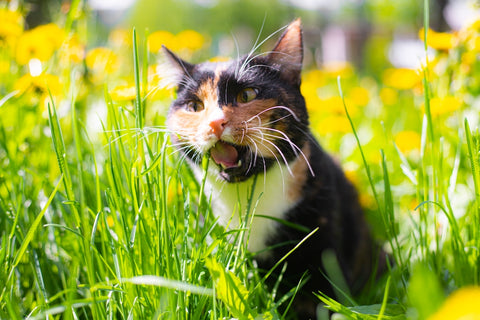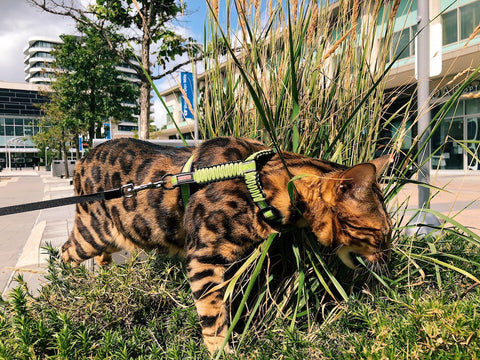The Curious Case of Feline Herbivores: Why Do Cats Eat Grass?
Cats are known for their unique and sometimes perplexing behaviors. One such behavior that often leaves cat owners scratching their heads is their tendency to munch on grass. While cats are obligate carnivores and primarily require a diet rich in meat, their occasional craving for greens is a common sight.
The Ultimate Guide to Cats Eating Grass

The Truth About Cats and Grass
Natural Instinct
Cats are descended from wild ancestors who were natural hunters. In the wild, the stomach contents of their prey often included plant matter. Therefore, eating grass might be a natural instinct that helps them regulate their digestive system. By consuming grass, cats can induce vomiting, which can help them get rid of any indigestible material or hairballs from their stomachs.
Aid in Digestion
Grass contains dietary fiber, which can aid in the digestion process. It can help move food through the digestive tract more smoothly, preventing constipation and promoting regular bowel movements. The additional fiber can be particularly helpful for indoor cats that may not have access to the roughage found in the diets of their outdoor counterparts.
Nutritional Supplementation
Cats might be drawn to grass because it provides essential nutrients they might be lacking in their regular diet. Grass is a source of vitamins and minerals, such as folic acid, which can be beneficial for their overall health. Cats are known to have an innate sense of what their body needs, and eating grass may be a way for them to supplement their diet.
Alleviating Discomfort
Sometimes, cats may consume grass to alleviate discomfort or irritation in their stomachs. For instance, if they have a hairball or stomach upset, the mechanical action of grass can help soothe their digestive tract and provide some relief.
Behavioral Enrichment
Cats are natural explorers, and they often seek out novel experiences. Chewing on grass can be a form of environmental enrichment for indoor cats. It allows them to engage their senses, taste different textures, and stimulate their curiosity.
The Taste Factor
Cats might simply enjoy the taste and texture of grass. For some, it's a sensory experience that they find pleasurable, similar to how humans might enjoy snacking on certain foods.
Regurgitation and Hairball Control
One of the primary reasons cats eat grass is to promote regurgitation. When they consume grass, it irritates the lining of their stomach. This irritation can induce vomiting, which helps cats expel any indigestible material, including hairballs. For many cats, this is a natural and effective way to prevent hairballs from becoming a digestive issue.
Plant-Based Nutrients
In the wild, the stomach contents of a cat's prey often include plant matter. Cats might consume grass to obtain plant-based nutrients, such as chlorophyll. These nutrients can provide various health benefits, including detoxification and improving overall well-being.
Self-Medication
Some researchers believe that cats may eat grass as a form of self-medication. When they have an upset stomach or digestive discomfort, they instinctively turn to grass to alleviate their symptoms. The fiber in grass can help with gastrointestinal issues, and cats might be aware of this remedy through trial and error.
Social Learning
Cats are observant animals, and if they see other cats or even their owners interacting with and eating plants, they might be influenced to do the same. Cats may learn the behavior from their environment, especially if they witness other cats grazing on greens.
Reducing Boredom
For indoor cats, access to outdoor plants can be limited. Eating grass might provide indoor cats with a form of entertainment and sensory stimulation. It can also serve as a way for them to alleviate boredom, particularly if they don't have access to other enrichment activities.
Appetite Stimulation
Cats may eat grass to stimulate their appetite. Chewing on grass can activate their taste buds and encourage them to eat more. This can be especially helpful for cats with a reduced appetite, as the act of eating grass can trigger a desire for other foods.
Stress and Anxiety Relief
Chewing on grass may provide stress relief for some cats. The repetitive motion of nibbling on grass can have a soothing effect on a cat's nerves, similar to how some humans find comfort in activities like chewing gum or fidgeting.
Response to Seasonal Changes
Cats might eat more grass during certain times of the year. For example, during the spring and summer when grass is more abundant, you might notice an increase in your cat's grass-eating behavior. This could be related to seasonal changes in their environment and the availability of fresh greens.
Breed and Individual Variations
Not all cats have the same level of interest in eating grass. Some breeds or individual cats may show a stronger preference for this behavior than others. This variation is part of what makes each cat unique.
It's a Nurturing Instinct
Mother cats often bring food to their kittens as part of their nurturing behavior. Some experts believe that cats may eat grass as a way to nurture their young, mimicking this instinct even when they have no kittens to care for. It's a way of expressing their maternal or caregiving instincts.

Is It Okay for My Cat to Eat Grass? Should You Be Concerned?
In general, occasional grass consumption by your cat is not a cause for concern. However, it's essential to keep a few things in mind:
Ensure Safety: If your cat eats grass, make sure the grass is free from pesticides, herbicides, and other harmful chemicals that could be toxic to them.
Watch for Overindulgence: While occasional grass munching is natural, excessive consumption or a sudden increase in grass eating could be a sign of an underlying issue. If this behavior is persistent or your cat seems unwell, consult your veterinarian.
Provide Alternatives: To satisfy their craving for greens, you can consider providing safe indoor plants or cat grass (available in pet stores) for your feline friend.
It's a Natural Behavior
In conclusion, cats have been living alongside humans for thousands of years, and during that time, their behavior has adapted to a domestic environment. While they are obligate carnivores, their natural instincts remain, and those instincts include occasional grass consumption. It's part of what makes cats such unique and fascinating pets.
Leave a comment
